2020高三英语月考卷六新课标全国卷题型
- 格式:doc
- 大小:78.00 KB
- 文档页数:9
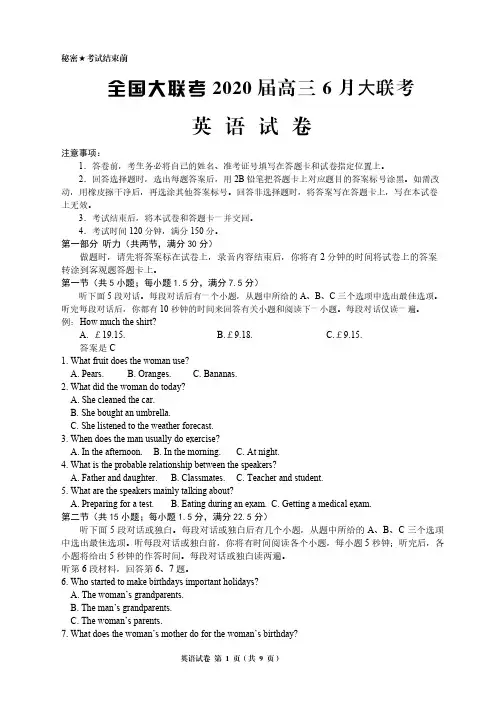
秘密★考试结束前全国大联考 2020 届高三 6 月大联考英语试卷注意事项:1.答卷前,考生务必将自己的姓名、准考证号填写在答题卡和试卷指定位置上。
2.回答选择题时,选出每题答案后,用 2B 铅笔把答题卡上对应题目的答案标号涂黑。
如需改动,用橡皮擦干净后,再选涂其他答案标号。
回答非选择题时,将答案写在答题卡上,写在本试卷上无效。
3.考试结束后,将本试卷和答题卡一并交回。
4.考试时间 120 分钟,满分 150 分。
第一部分 听力(共两节,满分 30 分)做题时,请先将答案标在试卷上,录音内容结束后,你将有 2 分钟的时间将试卷上的答案转涂到客观题答题卡上。
第一节(共 5 小题;每小题 1.5 分,满分 7.5 分)听下面 5 段对话。
每段对话后有一个小题,从题中所给的 A、B、C 三个选项中选出最佳选项。
听完每段对话后,你都有 10 秒钟的时间来回答有关小题和阅读下一小题。
每段对话仅读一遍。
例:How much the shirt?A. £19.15.B.£9.18.C.£9.15.答案是 C1. What fruit does the woman use?A. Pears. B. Oranges. C. Bananas.2. What did the woman do today?A. She cleaned the car.B. She bought an umbrella.C. She listened to the weather forecast.3. When does the man usually do exercise?A. In the afternoon. B. In the morning. C. At night.4. What is the probable relationship between the speakers?A. Father and daughter. B. Classmates. C. Teacher and student.5. What are the speakers mainly talking about?A. Preparing for a test. B. Eating during an exam. C. Getting a medical exam.第二节(共 15 小题;每小题 1.5 分,满分 22.5 分)听下面 5 段对话或独白。
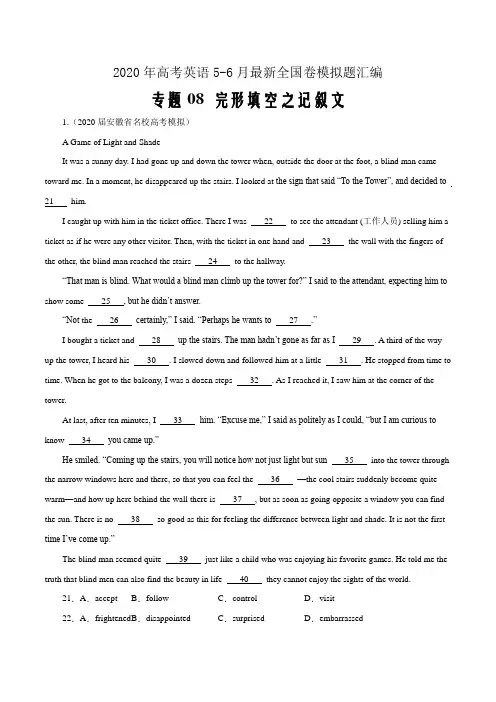
2020年高考英语5-6月最新全国卷模拟题汇编专题08 完形填空之记叙文1.(2020届安徽省名校高考模拟)A Game of Light and ShadeIt was a sunny day. I had gone up and down the tower when, outside the door at the foot, a blind man came toward me. In a moment, he disappeared up the stairs. I looked at the sign that said “To the Tower”, and decided to21 him.I caught up with him in the ticket office. There I was 22 to see the attendant (工作人员) selling him a ticket as if he were any other visitor. Then, with the ticket in one hand and 23 the wall with the fingers of the other, the blind man reached the stairs 24 to the hallway.“That man is blind. What would a blind man climb up the tower for?” I said to the attendant, expecting him to show some 25 , but he didn’t answer.“Not the 26 certainly,” I said. “Perhaps he wants to 27 .”I bought a ticket and 28 up the stairs. The man hadn’t gone as far as I 29 . A third of the way up the tower, I heard his 30 . I slowed down and followed him at a little 31 . He stopped from time to time. When he got to the balcony, I was a dozen steps 32 . As I reached it, I saw him at the corner of the tower.At last, after ten minutes, I 33 him. “Excuse me,” I said as politely as I could, “but I am curious to know 34 you came up.”He smiled. “Coming up the stairs, you will notice how not just light but sun 35 into the tower through the narrow windows here and there, so that you can feel the 36 —the cool stairs suddenly become quite warm—and how up here behind the wall there is 37 , but as soon as going opposite a window you can find the sun. There is no 38 so good as this for feeling the difference between light and shade. It is not the first time I’ve come up.”The blind man seemed quite 39 just like a child who was enjoying his favorite games. He told me the truth that blind men can also find the beauty in life 40 they cannot enjoy the sights of the world.21.A.accept B.follow C.control D.visit22.A.frightened B.disappointed C.surprised D.embarrassed23.A.touching B.climbing C.hitting D.covering 24.A.pointing B.attaching C.contributing D.leading 25.A.respect B.doubt C.concern D.sympathy 26.A.view B.test C.prize D.trick27.A.kick B.jump C.relax D.escape 28.A.struggled B.explored C.wandered D.hurried 29.A.promised B.examined C.imagined D.confirmed 30.A.steps B.words C.secrets D.cheers 31.A.standard B.distance C.expense D.intention 32.A.ahead B.around C.outside D.behind 33.A.recognized B.surrounded C.approached D.witnessed 34.A.why B.how C.when D.whether 35.A.knocks B.pours C.slides D.bursts36.A.trend B.reaction C.change D.honor37.A.light B.space C.mess D.shade38.A.place B.signal C.object D.period 39.A.nervous B.content C.curious D.patient 40.A.unless B.because C.once D.although【答案】21.B22.C23.A24.D25.C26.A27.B28.D29.C30.A31.B32.D33.C34.A35.B36.C37.D38.A39.B40.D【解析】本文是一篇记叙文,作者跟随着一位盲人登塔,盲人告诉他尽管盲人们无法享受世界上的风景,但他们也能找到生活里的美。
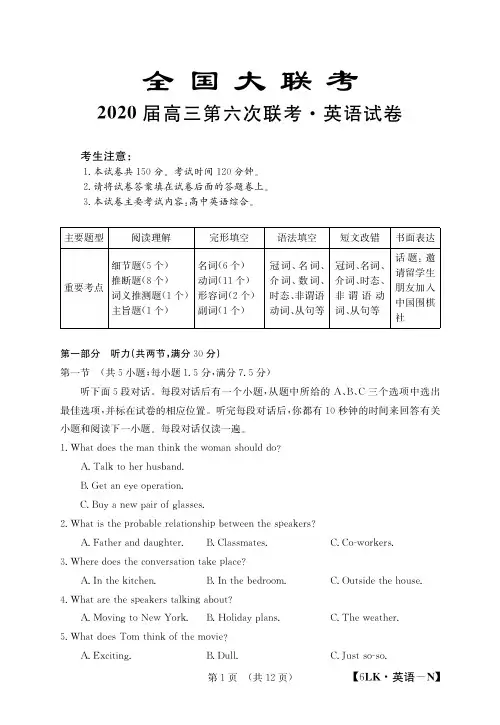
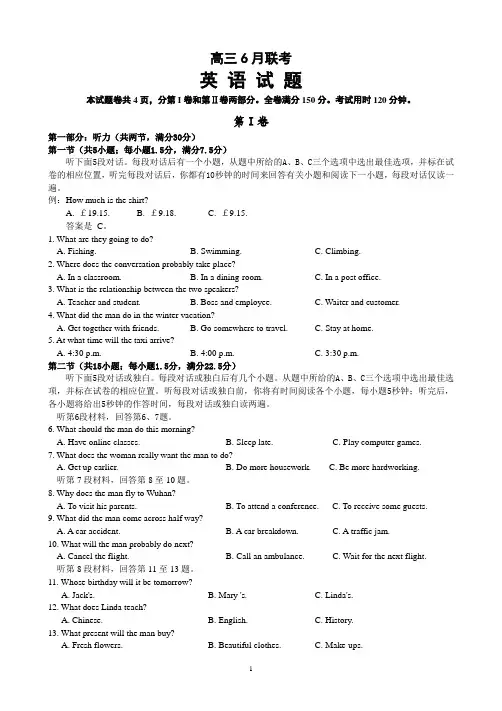
高三6月联考英语试题本试题卷共4页,分第I卷和第Ⅱ卷两部分。
全卷满分150分。
考试用时120分钟。
第Ⅰ卷第一部分:听力(共两节,满分30分)第一节(共5小题;每小题1.5分,满分7.5分)听下面5段对话。
每段对话后有一个小题,从题中所给的A、B、C三个选项中选出最佳选项,并标在试卷的相应位置,听完每段对话后,你都有10秒钟的时间来回答有关小题和阅读下一小题,每段对话仅读一遍。
例:How much is the shirt?A. £19.15.B. £9.18.C. £9.15.答案是C。
1. What are they going to do?A. Fishing.B. Swimming.C. Climbing.2. Where does the conversation probably take place?A. In a classroom.B. In a dining-room.C. In a post office.3. What is the relationship between the two speakers?A. Teacher and student.B. Boss and employee.C. Waiter and customer.4. What did the man do in the winter vacation?A. Get together with friends.B. Go somewhere to travel.C. Stay at home.5. At what time will the taxi arrive?A. 4:30 p.m.B. 4:00 p.m.C. 3:30 p.m.第二节(共15小题;每小题1.5分,满分22.5分)听下面5段对话或独白。
每段对话或独白后有几个小题。
从题中所给的A、B、C三个选项中选出最佳选项,并标在试卷的相应位置。
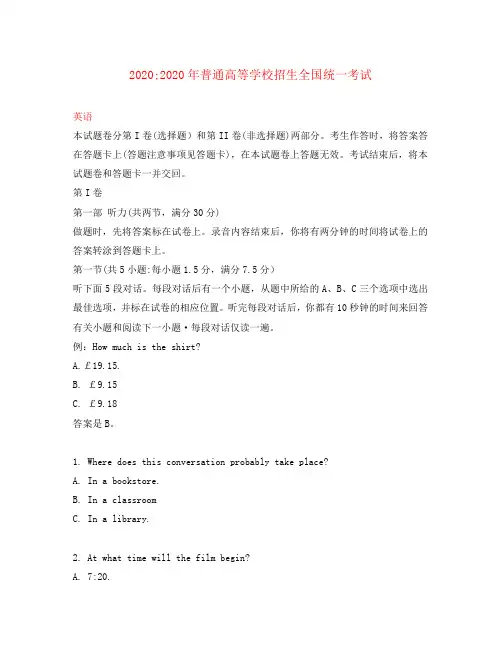
2020;2020年普通高等学校招生全国统一考试英语本试题卷分第I卷(选择题)和第II卷(非选择题)两部分。
考生作答时,将答案答在答题卡上(答题注意事项见答题卡),在本试题卷上答题无效。
考试结束后,将本试题卷和答题卡一并交回。
第I卷第一部听力(共两节,满分30分)做题时,先将答案标在试卷上。
录音内容结束后,你将有两分钟的时间将试卷上的答案转涂到答题卡上。
第一节(共5小题:每小题1.5分,满分7.5分)听下面5段对话。
每段对话后有一个小题,从题中所给的A、B、C三个选项中选出最佳选项,并标在试卷的相应位置。
听完每段对话后,你都有10秒钟的时间来回答有关小题和阅读下一小题·每段对话仅读一遍。
例:How much is the shirt?A.£19.15.B. £9.15C. £9.18答案是B。
1. Where does this conversation probably take place?A. In a bookstore.B. In a classroomC. In a library.2. At what time will the film begin?A. 7:20.C. 7:00.3. What are the two speakers mainly talking about?A.Their friend Jane.B. A weekend trip.C. A radio programme.4. What will the woman probably do?A. Catch a train.B. See the man off.C. Go shopping.i5. Why did the woman apologize?A. She made a late delivery.B. bne went to the wrong place.C. She couldn't take the cake back.第二节(共15小题:每小题1.5分,满分22.5分)听下面5段对话。
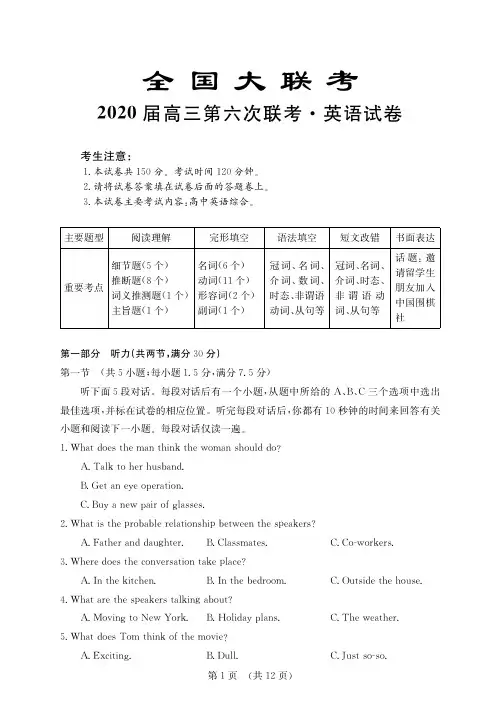

2020年普通高等学校招生全国统一考试(全国卷I)英语注意事项:1.答卷前,考生务必将自己的姓名、准考证号填写在答题卡和试卷指定位置上。
2.回答选择题时,选出每小题答案后,用铅笔把答题卡上对应题目的答案标号涂黑。
如需改动,用橡皮擦干净后,再选涂其他答案标号。
回答非选择题时,将答案写在答题卡上,写在本试卷上无效。
3.考试结束后,将本试卷和答题卡一并交回。
版本一(适用地区:河南、山西)第一部分听力(共两节,满分30分)做题时,先将答案标在试卷上。
录音内容结束后,你将有两分钟的时间将试卷上的答案转涂到答题卡上。
第一节(共5小题;每小题1.5分,满分7.5分)听下面5段对话。
每段对话后有一个小题,从题中所给的A、B C三个选项中选出最佳选项。
听完每段对话后,你都有10秒钟的时间来回答有关小题和阅读下一小题。
每段对话仅读一遍。
例:How much is the shirt?A. £9.15.B. g.18.C. 9U5.答案是C o1. Where are the speakers?A. At a swim ming pool.B. In a cloth ing shop.C. At a school lab.【答案】B【解析】【原文】本题为听力题,解析略。
2. What will Tom do next?A. Tur n dow n the music.B. Postp one the show.C. Stop practici ng.【答案】C【解析】【原文】本题为听力题,解析略。
3. What is the woma n busy doing?A. Working on a paper.B. Tidying up the office.C. Organizing a party.【答案】C【解析】【原文】本题为听力题,解析略。
4. When will Henry start his vacation?A. This weekend.B. Next week.C. At the end of August.【答案】A【解析】【原文】本题为听力题,解析略。
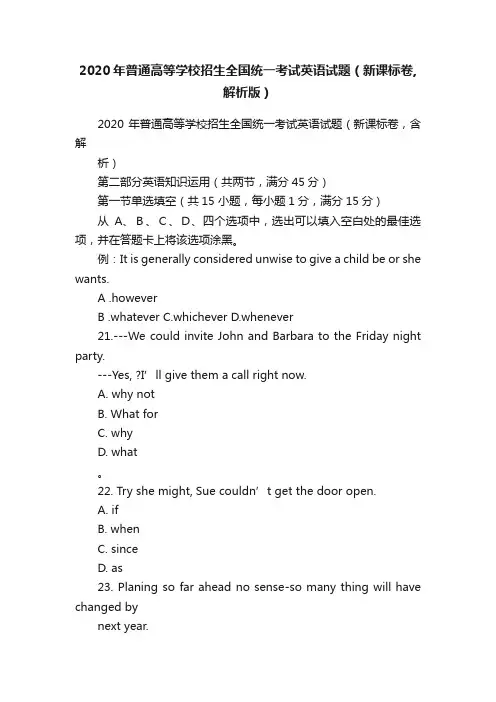
2020年普通高等学校招生全国统一考试英语试题(新课标卷,解析版)2020年普通高等学校招生全国统一考试英语试题(新课标卷,含解析)第二部分英语知识运用(共两节,满分45分)第一节单选填空(共15 小题,每小题1分,满分15分)从A、B、C、D、四个选项中,选出可以填入空白处的最佳选项,并在答题卡上将该选项涂黑。
例:It is generally considered unwise to give a child be or she wants.A .howeverB .whatever C.whichever D.whenever21.---We could invite John and Barbara to the Friday night party.---Yes, ?I’ll give them a call right now.A. why notB. What forC. whyD. what。
22. Try she might, Sue couldn’t get the door open.A. ifB. whenC. sinceD. as23. Planing so far ahead no sense-so many thing will have changed bynext year.A.madeB.is makingC.makesD.has made24.I wasn’t sure if he was really interested or if he polite.A.was just beingB.will just beC.had just beenD.would just be25.-Someone wants you on the phone.- nobody knows I am here.A.AlthoughB.AndC.ButD.So26.I can the house being untidy, but I hate it if it’s not clean.A. come up withB.put up withC. turn toD.stick to27.The next thing he saw was smoke from behind the house.A.roseB.risingC. to riseD.risen28.Only when he reached the tea-house it was the same place he’d been in last year.A. he realizedB.he did realizeC.realized heD.did he realize29.When Alice came to, she did not know how long she there.A.had been lyingB.has been lyingC.was lyingD.has lain30.The form cannot be signed by anyone yourself.A.rather thanB.other thanC.more thanD.better than31.The prize will go to the writer story shows the most imagination.A.thatB.whichC.whoseD.what32.They have arrived at lunchtime but their flight was delayed.A.willB.canC.mustD.should33.It is generally accepted that boy must learn to stand up and fight like man.A.a;aB.a;theC.the;theD.a;不填34.William found it increasingly difficult to read, for his eyesight was beginning to .A.disappearB.fallC.failD.damage35.—Artistic people can be very difficult sometimes.—Well, you married one. .A.You name itB.I’ve got itC.I can’t agree mor eD.You should know第二节完形填空(共20小题:每小题1.5分,满分30分)阅读下面的短文,从短文后各题所给的四个选项(A、B、C和D)中,选出可以填入空白处的最佳选项,并在答题卡上将该项涂黑。
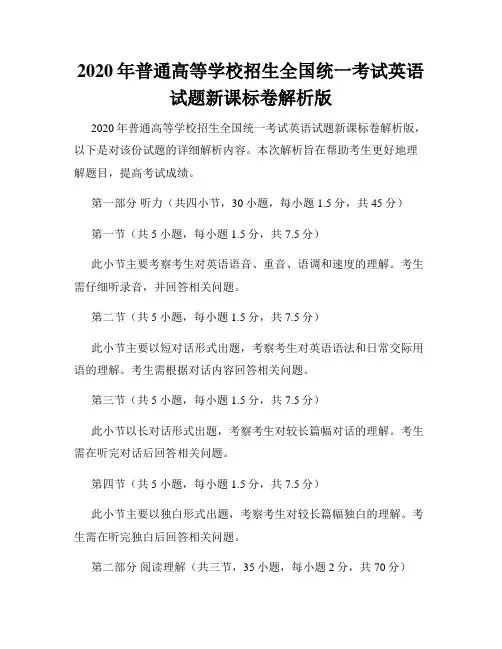
2020年普通高等学校招生全国统一考试英语试题新课标卷解析版2020年普通高等学校招生全国统一考试英语试题新课标卷解析版,以下是对该份试题的详细解析内容。
本次解析旨在帮助考生更好地理解题目,提高考试成绩。
第一部分听力(共四小节,30小题,每小题1.5分,共45分)第一节(共5小题,每小题1.5分,共7.5分)此小节主要考察考生对英语语音、重音、语调和速度的理解。
考生需仔细听录音,并回答相关问题。
第二节(共5小题,每小题1.5分,共7.5分)此小节主要以短对话形式出题,考察考生对英语语法和日常交际用语的理解。
考生需根据对话内容回答相关问题。
第三节(共5小题,每小题1.5分,共7.5分)此小节以长对话形式出题,考察考生对较长篇幅对话的理解。
考生需在听完对话后回答相关问题。
第四节(共5小题,每小题1.5分,共7.5分)此小节主要以独白形式出题,考察考生对较长篇幅独白的理解。
考生需在听完独白后回答相关问题。
第二部分阅读理解(共三节,35小题,每小题2分,共70分)第一节(共10小题,每小题2分,共20分)此小节主要以短文阅读形式出题,要求考生对短文内容进行理解和回答相关问题。
第二节(共10小题,每小题2分,共20分)此小节主要以短文阅读形式出题,要求考生对短文内容进行理解、分析和推理。
第三节(共15小题,每小题2分,共30分)此小节主要以短文阅读形式出题,要求考生对短文内容进行理解、分析、推理和判断。
第三部分笔试(共三节,45小题,每小题1.5分,共67.5分)第一节完形填空(共15小题,每小题1.5分,共22.5分)此小节主要考察考生对词汇和语法的理解,以及对短文整体内容的把握。
考生需根据短文内容选择正确答案。
第二节语法填空(共10小题,每小题1.5分,共15分)此小节主要考察考生对英语语法的掌握情况。
考生需根据上下文语境,使用正确的形式填充空白处。
第三节阅读理解(共20小题,每小题1.5分,共30分)此小节主要以短文阅读形式出题,要求考生对短文内容进行理解、分析和推理。
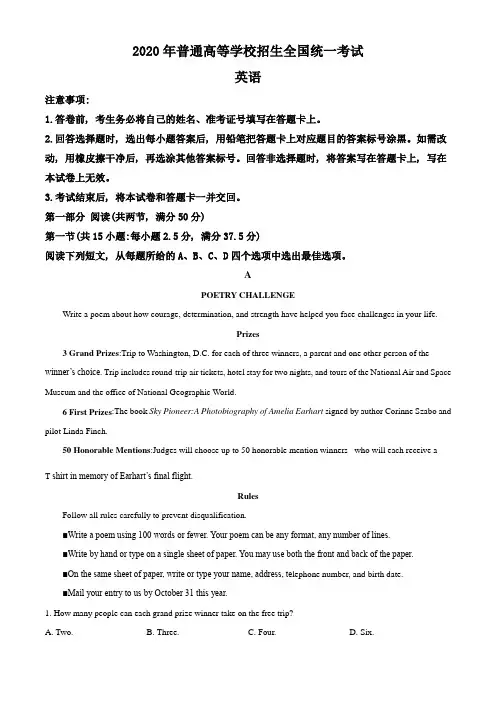
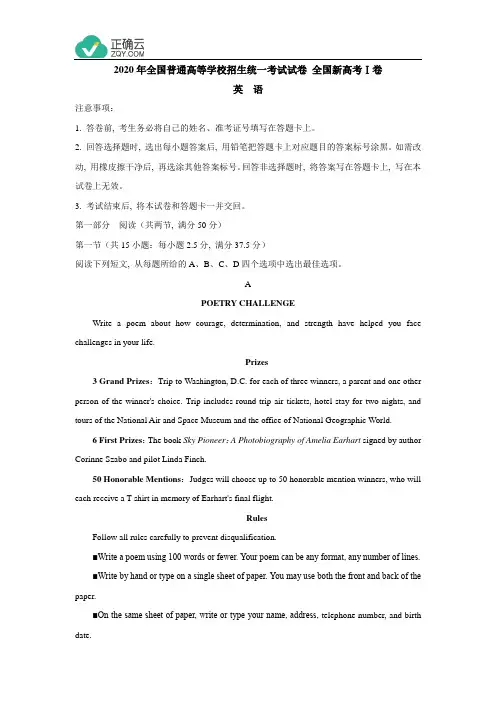
2020年全国普通高等学校招生统一考试试卷全国新高考Ⅰ卷英语注意事项:1. 答卷前, 考生务必将自己的姓名、准考证号填写在答题卡上。
2. 回答选择题时, 选出每小题答案后, 用铅笔把答题卡上对应题目的答案标号涂黑。
如需改动, 用橡皮擦干净后, 再选涂其他答案标号。
回答非选择题时, 将答案写在答题卡上, 写在本试卷上无效。
3. 考试结束后, 将本试卷和答题卡一并交回。
第一部分阅读(共两节, 满分50分)第一节(共15小题:每小题2.5分, 满分37.5分)阅读下列短文, 从每题所给的A、B、C、D四个选项中选出最佳选项。
APOETRY CHALLENGEWrite a poem about how courage, determination, and strength have helped you face challenges in your life.Prizes3 Grand Prizes:Trip to Washington, D.C. for each of three winners, a parent and one other person of the winner's choice. Trip includes round-trip air tickets, hotel stay for two nights, and tours of the National Air and Space Museum and the office of National Geographic World.6 First Prizes:The book Sky Pioneer:A Photobiography of Amelia Earhart signed by author Corinne Szabo and pilot Linda Finch.50 Honorable Mentions:Judges will choose up to 50 honorable mention winners, who will each receive a T-shirt in memory of Earhart's final flight.RulesFollow all rules carefully to prevent disqualification.■Write a poem using 100 words or fewer. Your poem can be any format, any number of lines.■Write by hand or type on a single sheet of paper. You may use both the front and back of the paper.■On the same sheet of paper, write or type your name, address, telephone number, and birth date.■Mail your entry to us by October 31 this year.1. How many people can each grand prize winner take on the free trip? ()A. Two.B. Three.C. Four.D. Six.2. What will each of the honorable mention winners get? ()A. A plane ticket.B. A book by Corinne Szabo.C. A special T-shirt.D. A photo of Amelia Earhart.3. Which of the following will result in disqualification? ()A. Typing your poem out.B. Writing a poem of 120 words.C. Using both sides of the paper.D. Mailing your entry on October 30.BJenifer Mauer has needed more willpower than the typical college student to pursue her goal of earning a nursing degree. That willpower bore fruit when Jennifer graduated from University of Wisconsin-Eau Claire and became the first in her large family to earn a bachelor's degree.Mauer, of Edgar, Wisconsin, grew up on a farm in a family of 10 children. Her dad worked at a job away from the farm, and her mother ran the farm with the kids. After high school, Jennifer attended a local technical college, working to pay her tuition(学费), because there was no extra money set aside for a college education. After graduation, she worked to help her sisters and brothers pay for their schooling.Jennifer now is married and has three children of her own. She decided to go back to college to advance her career and to be able to better support her family while doing something she loves: nursing. She chose the UW-Eau Claire program at Ministry Saint Joseph's Hospital in Marshfield because she was able to pursue her four-year degree close to home. She could drive to class and be home in the evening to help with her kids. Jenifer received great support from her family as she worked to car her degree: Her husband worked two jobs to cover the bills, and her 68-year-old mother helped take care of the children at times.Through it all, she remained in good academic standing and graduated with honors. Jennifer sacrificed(牺牲)to achieve her goal, giving up many nights with her kids and missing important events to study. “Some nights my heart was breaking to have to pick betw een my kids and studying for exams or papers,” she says. However, her children have learned an important lesson witnessing their mother earn her degree. Jennifer is a first-generation graduate and an inspirationto her family-and that's pretty powerful.4. What did Jennifer do after high school? ()A. She helped her dad with his work.B. She ran the family farm on her own.C. She supported herself through college.D. She taught her sisters and brothers at home.5. Why did Jennifer choose the program at Ministry Saint Joseph's Hospital in Marshfield? ()A. To take care of her kids easily.B. To learn from the best nurses.C. To save money for her parents.D. To find a well-paid job there.6. What did Jennifer sacrifice to achieve her goal? ()A. Her health.B. Her time with family.C. Her reputation.D. Her chance of promotion.7. What can we learn from Jenifer's story? ()A. Time is money.B. Love breaks down barriers.C. Hard work pays off.D. Education is the key to success.CIn the mid-1990s, Tom Bissell taught English as a volunteer in Uzbekistan. He left after seven months, physically broken and having lost his mind. A few years later, still attracted to the country, he returned to Uzbekistan to write an article about the disappearance of the Aral Sea.His visit, however, ended up involving a lot more than that. Hence this book, Chasing the Sea: Lost Among the Ghosts of Empire in Central Asia, which talks about a road trip from Tashkent to Karakalpakstan, where millions of lives have been destroyed by the slow drying up of the sea. It is the story of an American travelling to a strange land, and of the people he meets on his way: Rustam, his translator, a lovely 24-year-old who picked up his colorful English in California, Oleg and Natasha, his hosts in Tashkent, and a string of foreign aid workers.This is a quick look at life in Uzbekistan, made of friendliness and warmth, but also its darker side of society. In Samarkand, Mr Bissell admires the architectural wonders, while on his way to Bukhara he gets a taste of police methods when suspected of drug dealing. In Ferghana, he attends a mountain funeral(葬礼)followed by a strange drinking party. And in Karakalpakstan, he issaddened by the dust storms, diseases and fishing boats stuck miles from the sea.Mr Bissell skillfully organizes historical insights and cultural references, making his tale a well-rounded picture of Uzbekistan, seen from Western eyes. His judgment and references are decidedly American, as well as his delicate stomach. As the author explains, this is neither a travel nor a history book, or even a piece of reportage. Whatever it is, the result is a fine and vivid description of the purest of Central Asian traditions.8. What made Mr Bissell return to Uzbekistan? ()A. His friends' invitation.B. His interest in the country.C. His love for teaching.D. His desire to regain health.9. What does the underlined word “that” in paragraph 2 refer to? ()A. Developing a serious mental disease.B. Taking a guided tour in Central Asia.C. Working as a volunteer in Uzbekistan.D. Writing an article about the Aral Sea.10. Which of the following best describes Mr Bissell's road trip in Uzbekistan? ()A. Romantic.B. Eventful.C. Pleasant.D. Dangerous.11. What is the purpose of this text? ()A. To introduce a book.B. To explain a cultural phenomenon.C. To remember a writer.D. To recommend a travel destination.DAccording to a recent study in the Journal of Consumer Research, both the size and consumption habits of our eating companions can influence our food intake. And contrary to existing research that says you should avoid eating with heavier people who order large portions (份), it's the beanpoles with big appetites you really need to avoid.To test the effect of social influence on eating habits, the researchers conducted two experiments. In the first, 95 undergraduate women were individually invited into a lab to ostensibly(表面上)participate in a study about movie viewership. Before the film began, each woman was asked to help herself to a snack. An actor hired by the researchers grabbed her food first. In her natural state, the actor weighed 105 pounds. But in half the cases she wore a specially designed fat suit which increased her weight to 180 pounds.Both the fat and thin versions of the actor took a large amount of food. The participants followed suit, taking more food than they normally would have. However, they took significantly more when the actor was thin.For the second test, in one case the thin actor took two pieces of candy from the snack bowls. In the other case, she took 30 pieces. The results were similar to the first test: the participants followed suit but took significantly more candy when the thin actor took 30 pieces.The tests show that the social environment is extremely influential when we're making decisions. If this fellow participant is going to eat more, so will I. Call it the “I’ll have what she's having” effe ct. However, we'll adjust the influence. If an overweight person is having a large portion, I'll hold back a bit because I see the results of his eating habits. But if a thin person eats a lot, I'll follow suit. If he can eat much and keep slim, why can't I?12. What is the recent study mainly about? ()A. Food safety.B. Movie viewership.C. Consumer demand.D. Eating behavior.13. What does the underlined word "beanpoles" in paragraph 1 refer to? ()A. Big eaters.B. Overweight persons.C. Picky eaters.D. Tall thin persons.14. Why did the researchers hire the actor? ()A. To see how she would affect the participants.B. To test if the participants could recognize her.C. To find out what she would do in the two tests.D. To study why she could keep her weight down.15. On what basis do we "adjust the influence" according to the last paragraph? ()A. How hungry we are.B. How slim we want to be.C. How we perceive others.D. How we feel about the food.第二节(共5小题:每小题2. 5分, 满分12. 5分)阅读下面短文, 从短文后的选项中选出可以填入空白处的最佳选项。
2019高三第六次考试英语试题试题说明:1. 总分 150=(阅读40+完形20+完成句子10+语法填空15+改错10+作文25)*1.252. 高频错题再练:1)主旨大意:27,31,35 2)猜测词义/句意:29,34, 3)完成句子第二部分阅读理解 (共两节,满分40分)第一节(共15小题;每小题2分,满分30分)请阅读下列短文,从每题所给的四个选项(A、B、C和D)中,选出最佳选项,并在答题卡上将该项的标号涂黑。
AOpening week specials at Munchies Food Hall.At the corner of Green and Brown Streets in the cityMonday 6th of January until Sunday 14th of January 2018Feast until you’re full! Come down to Munchies time week to enjoy the special dishes on offer at all of our food outlets. Order from the following:●Succulent chicken rice ●Spicy satay beef●Delicious noodle dishes ●Plump pork chops●Seafood specialties ●Crunchy vegetables●Sweet tropical fruitHala food is available at the stall Malay Mood HeavenWin Prizes and Gifts!Spend $20.00 or more and win instant prizes from our lucky draw box.Collect a free party balloon and whistle for each young diner.Enjoy a free meal if you are the first customer of the day at any of our stalls. Win a holiday to Western Australia. A free raffle ticket is given with every receipt. Just fill in your information and place your entry in the box provided.1. Munchies Fool Hall does NOT sell_____.A. lambB. beefC. porkD. chicken2. The prices at Munchies are______.A. lower than usualB. bargain prices for the openingC. lower for two peopleD. lower if you spend $21,003. I will find out who has won the top to Western Australia when I_____.A. watch Channel 3 televisionB. come down to Munchies at moonC. read The Straits Times on the 15th of JanuaryD. attend the lucky draw at Munchies Food Hall【答案】1. A 2. D 3. C【解析】试题分析:本文是一篇摘自报刊上的餐厅促销活动的广告【小题1】A细节理解题。
语法填空河北衡水中学2020届全国高三第一次联合考试第二节 (共10小题;每小题1.5分,满分15分)阅读下面短文,在空白处填入1个适当的单词或括号内单词的正确形式。
Monkeys do not like it when others get more food 61 they do, according to a new study.Researchers from Yale and Harvard universities found Capuchin monkeys punish monkeys62 get more food. "This sort of, 'If I can't have it, no one can ' response is because 63 psychological spite (怨恨),and it was 64 (previous) thought unique to humans," said Kristin Leimgruber of Harvard University. She is a co-author of the research study. The researchers watched as some Capuchin monkeys 65 (give) more food than others. They found that monkeys getting the 66 (small) share pulled a rope to fold up a table holding the other monkey's bigger share.Another lead researcher, Laurie Santas, 67 (explain) over email, "I think what we can conclude about humans is that some of our more embarrassing tendencies have relatively deep 68 (root)." Santos said the spiteful response was not present with another member of the ape species— chimpanzees(黑猩猩).An earlier study, she said. showed chimpanzees would fold up the table of other chimpanzees 69 (steal) food from them. But they would not punish chimpanzees who just happened 70 (have) more food, Santos said. In other words, it was fine if another chimpanzee had more food as long as they did not steal it. 第二节61. than 62 . that / which/ who 63.of 64. Previously 65.were given66.smaller 67.explained 68.roots 69.stea li ng 70. to have评分标准:61 — 70小题,每小题1. 5分,满分15分;与所给答案不符,但所填单词符合语境、文义通顺、语法形式和拼写正确可得分。
2020年普通高等学校招生全国统一考试(江苏卷)英语第二部分:英语知识运用(共两节,满分35分)第一节:单项填空(共15小题;每小题1分,满分15分)请认真阅读下面各题,从题中所给的A、B、C、D四个选项中,选出最佳选项。
例:It is generally considered unwise to give a child _______ he or she wants.A. howeverB. whateverC. whicheverD. whenever答案是B。
21. By boat is the only way to get here, which is _______ we arrived.A. whereB. whenC. whyD. how解析:考查名词性从句。
句意:乘船是到达这里唯一的途径,这就是我们如何到达的。
分析which引导的非限定性定语从句可知,后面为表语从句。
分析句意可知,这里用连接副词how引导表语从句,充当方式状语,表示“如何”。
故选D。
答案:D22. Kids shouldn’t have access to violent films because they might _______ the things they see.A. indicateB. investigateC. imitateD. innovate解析:考查动词词义辨析及语境理解。
句意:孩子不应该接触暴力电影,因为他们也许会模仿他们所见的事情。
A. indicate指示;B. investigate调查;C. imitate模仿;D. innovate改革。
故选C。
答案:C23. Self-driving is an area _______ China and the rest of the world are on the same starting line.A. thatB. whereC. whichD. when解析:考查定语从句。
专题05阅读理解之议论文1.(2020届安徽省蚌埠市高三第三次质检)Scientist,conservation organizations and government trying to stop the trend of extinction (灭绝)often focus on protected areas such as national parks and wildlife preserves. But with as many as million species(物种)at risk,this plan of action may not be enough to conserve wildlife.Slowing the mass extinction that now appears to be underway will require more creative means of coexisting alongside wild plants and animals. A new study indicates the effectiveness of some such approaches by examining some lands managed by indigenous groups.“ We show really strongly that,from a biodiversity standpoint in terms of species richness,indigenous -managed lands are at least comparable to protected areas,” says biologist Richard Schuster of Carleton University. And in some places,they are better than parks and preserves -even though indigenous communities may use their lands’ resources by hunting or searching for food.Schuster and his team analyzed more than 15,000 areas in Australia,Brazil and Canada. They found that the total diversity of wildlife was highest on lands either managed or co -managed by indigenous groups,while randomly selected areas with no formal protection were the least bio-diverse. For threatened species in particular,indigenous lands scored slightly higher than protected lands on overall species richness in Brazil and Canada,as well as higher for threatened animals in Australia.Each country has a different geography,climate and history. Yet remarkably,Schuster says,the best indicator for species diversity is whether a given area was managed by an indigenous community. He pointed out that practices such as sustainable(可持续的)hunting,fishing and searching,as well as burning,are more likely to occur in such areas. Don Hankins,an ecologist at California State University,agrees. “ there’ s probably going to be more of a connection to the land,” he says,“ and a use of the land for the things that are there,compared to a national park. ”“ It’ s really important to listen to the people who live on the land and have them drive the stewardship efforts going forward,” Schuster says,adding that partnering with indigenous communities may enable the world’ s countries to better meet a wide range of conservation goals:“ We really need all the help we can get as a global community to prevent species extinction that we’ re facing right now. ”8.What does the underlined word “ indigenous” probably mean in Paragraph 2?A.Social. B.Native.C.Protected. D.Threatened.9.What did Richard Schuster find in his study?A.National parks are even higher in species diversity.B.Indigenous communities overhunted on their lands.C.Some preserves almost have no formal protection.D.Indigenous lands do better in keeping bio-diversity.10.Which of the following statements may Don Hankins agree with?A.Species diversity depends on geographical positions.B.Humans’ everyday activities are no longer sustainable.C.Indigenous groups have a close bond with their lands.D.Protected areas work perfectly in wildlife protection.11.What is the text mainly about?A.Beating back extinction. B.Dealing with environmental problems.C.Setting up nature reserves. D.Fighting against unsustainable behaviors.【答案】8.B9.D10.C11.A【解析】本文为议论文。
2020年普通高等学校招生全国统一考试英语试题(全国卷,含答案)本试卷分第一卷(选择题)和第二卷(非选择题)两部分。
第一卷1至12页。
第二卷13至14页。
考试结束后,将本试卷和答题卡一并交回。
第一卷注意事项:1.答第一卷前,考生务必将自己的姓名、准考证号填写在答题卡上。
2.每小题选出答案后,用铅笔把答题卡上对应题目的答案标号涂黑。
如需改动,用橡皮擦干净后,再选涂其他答案标号。
不能答在试卷上。
第一部分英语知识运用(共三节,满分50分)第一节语音知识(共5小题;每小题1分,满分5分)1高1考1资1源1网1 从A, B, C, D四个选项中,找出其划线部分与所给单词的划线部分读音相同的选项,并在答题卡上将该项涂黑。
例:haveA. gaveB. saveC. hatD. made答案是C。
1 .cushionA. buttonB. butcherC. buryD. duty2. countryA.announceB. coughC. encourageD. shoulder3 .pillowA. flowerB. allowC. knowledgeD. follow4. reachA. breatheB. reallyC. pleasureD. heaven5 .ChristmasA. handkerchiefB. teacherC. acheD. merchant第二节语法和词汇知识(共15小题;每小题1分,满分15分)从A, B, C, D四个选项中,选出可以填入空白处的最佳选项,并在答题卡上将该项涂黑。
例:It is generally considered unwise to give a child he or she wants.A. howeverB. whateverC. whicheverD. whenever答案是B。
6. ----Did you forget about my birthday?---- I’ve booked a table at Michel’s restaurant for this evening.A. What then?B. I’m afraid so.C. how could I?D. For sure.7. Ted came for the weekend wearing only some shorts and a T-shirt, is a stupid thing to do in such weather.A. thisB. thatC. whatD. which8. If you smoke, please go outside.A. canB. shouldC. mustD. may9. If you don't like the drink you______just leave it and try a different one.A. orderedB. are orderingC. will orderD. had ordered10. Mary, I_____John of his promise to help you.A. toldB. remindedC. warnedD. advised11. I got this bicycle for ;My friend gave it to me when she bought a new one.A. everythingB. somethingC. anythingD. nothing12. It is one thing to enjoy listening to good music, but it is another to play it well yourself.A. quiteB. veryC. ratherD. much13. Jane won’t join us for dinner tonight and .A. neither won’t TomB. Tom won’t eitherC. Tom will tooD. so will Tom14. This shop will be closed for repairs further notice.A. withB. untilC. forD. at15. The island, to the mainland by a bridge, is easy to go to.A. joiningB. to joinC. joinedD. having joined16. As he reached front door, Jack saw strange sight.A. the;不填B. a; theC.不填aD. the; a 17.Mr. Stevenson is great to work for -- I really couldn't ask for a_boss.A. betterB. goodC. bestD. still better 18.Sarah pretended to be cheerful,______nothing about the argument.A. says B: said C. to say D. saying19. It was a nice meal,_______a little expensive.A. thoughB. whetherC. asD. since20.-----So you gave her your phone?-----______she said she'd return it to me when she could afford her own.A. My pleasureB. Not exactlyC. No doubtD. All right第三节完形填空(共20小题;每小题1.5分,满分30分)阅读下面短文,从短文后各题所给的四个选项(A, B, C和D)中,选出可以填入空白处的最佳选项飞并在答题卡上将该项涂黑。
2016高三英语月考卷六第Ⅰ卷(100分)第一部分听力(略)第二部分阅读理解(共两节,满分40分)第一节(共15小题;每小题2分,满分30分)阅读下列短文,从每题所给的四个选项(A、B、C、和D)中,选出最佳选项,并在答题卡上将该项涂黑。
AHave you ever heard the saying “All roads lead to Rome”? At one time, this was pretty much true. During the Roman Empire, lots of roads were built in order to move armies, send messages by courier (信使), and make trade easier.The network of Roman roads was begun in 312 BC. It was demanded that the roads be built strong so that they would not fall down. Roman soldiers, supervised (监督) by engineers, laid down the roads in a special pattern of layers. There were all together 4 layers, which was made of different materials, such as sand, rocks, stones and so on.Also, Roman roads were cambered (拱形). This means that they were built higher in the middle than on the edges, allowing rainwater to run off, which prevented flooding. We use the same technique in building roads today. The Romans also laid out roads over hills when necessary, setting them down in a zigzag (之字形的)pattern to make the road rise gradually.All Roman roads had milestones (里程碑), placed every thousand paces (a Roman mile). The milestones told when the road was built, who was emperor at the time, the road’s destination, how far the traveler was from the destination, and how many miles had been traveled since the beginning of the road. This information was a great help to travelers.Because of their excellence in construction, it really is no surprise that many parts of Roman road still exist today. These roadways are one of the most impressive achievements of the Roman Empire.21. The following description about Roman roads is true EXCEPT _____.A. Roman roads were built by the Roman soldiers directed by the engineersB. Roman roads could prevent flooding using the techniqu e we don’t use todayC. Roman roads had milestones that were placed every Roman mileD. Roman roads still exist today as an impressive achievement of Roman Empire22. What information can you find on the milestones?A. The builders of the road.B. The materials used in building roads.C. The distance from one city.D. The time spent in building roads.23. The passage mainly ________.A. explains the saying “All roads lead to Rome”B. praises ancient Romans for their great achievementsC. shows how great the Roman Empire wasD. introduces the construction of the Roman roadsBAfter having worked in the University of Maryland for three years, I got a job offer from another university--Lynn University. I left my letter of offer on my present boss’s desk, turned around, and closed the door quietly. I was expecting a call from my boss saying congratulations, which would show her approval of my leaving.In the afternoon, my boss called me, saying, “Can we meet tomorrow?” That was a good signal. The next day, I met with my boss. She said, “Nicholas, we want you. What do you want?” I said, “Boss, I deserve a significant pay raise this year due to my outstanding performance. I think I need a 10% pay raise next year as a condition for me to stay here.” My boss said, “No problem.'”When I left her office, I called Lynn University and told them that I was going to get a 10% pay raise. They had to give me 10% more than their original pay offer in order for me to accept the job. The new boss told me that he was willing to give me more, but I would feel very bad working at this university with such a high pay. I would win a battle, but I would lose a war. He said, "The problem is that your colleague will earn less than you, so you will feel guilty and uncomfortable. But, I can still give you 5% more than the original offer."I delivered this massage to my present boss, and she told me that she would give me another5% pay raise if I promised to refuse this new job offer. On top of that, she would strongly support my early promotion from assistant professor to associate professor. According to the university policy, you must take at least 6 years to get promoted. That was my third year of employment at this university. After refusing the new job offer, I finally enjoyed both a pay raise and early promotion.24. In paragraph 2, what does Nicholas mean by “That was a good signal”?A. His boss would approve his leaving the University of Maryland.B. He would leave his present job and work for Lynn University.C. His boss would talk with him about a possible pay offer.D. His friends would congratulate him on getting a new job offer.25. Why did the new boss agree to another 5% raise when Nicholas asked for 10% the next day?A .He did not have the right to make such a big pay offer.B. he did not want Nicholas to earn more than he did.C. Nicholas was not experienced enough to get such a raise.D. Nicholas would not feel good for earning too much more than others.26. How much pay raise did the author finally get as a result of refusing the new job offer?A. 5%B. 10%C. 15%D. 20%27. In the text, the author mainly tells his experience of _______.A. earning a pay raiseB. refusing a job offerC. applying for a new positionD. making decisions in the workplaceCHortonAt first glance, there is little in Horton to attract people. The other nearby towns have much more to offer: Bradfield has its river and historic buildings, while Newtown has shops and entertainment. The buildings of Horton look dirty and unloved. For shops, there is a small supermarket, a few bargain shops, a bakery which, strangely, does not sell bread and a florist which has one stand of sad-looking flowers. Even so, Horton has several advantages over its neighbouring towns.Firstly, it has a country park. Four thousand years ago, this was an important fort. There are no historic remains here now, but there are wonderful views over the countryside. On sunny weekends you can often see kids out with their parents, kicking balls or flying kites.Ther e aren’t many job opportunities in Horton, and the roads to nearby cities aren’t really fast, but there are excellent rail links. You can be in London in an hour and a half, and other cities are less than an hour away. That means that parents can earn a good salary and still get home in time to spend the evenings with their families. Houses in Horton aren’t pretty, but they’re functional and cheap. The streets are quiet and safe, and there are plenty of parks and playgrounds. It has a library, three primary schools and a secondary school, St. Mark’s. It is friendly and offers a wide range of subjects and activities to children of all abilities and backgrounds. The town also has a swimming and a sports center, and the community halls hold regular clubs and events for people of all ages.28. What is the writer’s main purpose?A. To explain what tourists can do in Horton.B. To explain why Horton is a good place to live in.C. To explain why Horton is not as pleasant as other towns.D. To describe the history of Horton.29. Which part of Horton does the writer find disappointing?A. the shopsB. country parkC. transport linksD. the schools30. Which of the following is NOT the advantage of Horton?A. plenty of parks and playgroundsB. historical buildingsC. the quiet and safe streetsD. functional and cheap houses31. What advantages does Horton bring to workers?A. There are plenty of jobs available in the town.B. You can drive to nearby cities in a short time.C. You can get to several cities quickly by train.D. Working conditions are better here than in other towns.DAccording to researchers, money can buy happiness, but only if you spend it on someoneelse.Spending as little as $5 a day on someone else could significantly bring you happiness, the team at the University of British Columbia and Harvard Business School found.Their experiments on more than 630 Americans showed they were measurably (适度地) happier when they spent money on others--even if they thought spending the money on themselves would make them happier.“We wanted to test our theory that how people spend their money is at least as important as how much money they earn,” said Elizabeth Dunn, a psychologist at the University of British Columbia.They asked their 600 volunteers first to rate their general happiness, report their annual income and detail their monthly spending including bills, gifts for themselves, gifts for others and donations to charity.“Regardless of how much income each person made, t hose who spent money on others reported greater happiness, while those who spent more on themselves did not,” Dunn said in a statement.Dunn’s team also surveyed 16 employees at a company in Boston before and after they received an annual profit-sharing bonus of between $3,000 and $8,000.“Employees who devoted more of their bonus to pro-social (有益社会的) spending experienced greater happiness after receiving the bonus, and the manner in which they spent that bonus was a more important predictor of their happi ness than the size of the bonus itself,” they wrote in their report, published in the journal Science.They gave their volunteers $5 or $20 and half got clear instructions on how to spend it. Those who spent the money on someone or something else reported feeling happier about it.“These findings suggest that very minor alterations in spending allocations (分配) --as little as $5--may be enough to produce real gains in happiness on a given day,” Dunn said.32. According to the passage, ________.A. the more money you spend on others, the happier you areB. spending money on others can bring you happinessC. Elizabeth Dunn is a psychologist from Harvest Business SchoolD. six hundred volunteers took part in the experiment33. The 16 employees mentioned in the passage _________.A. were given clear instructions on how to spend the bonusB. had more happiness than the size of the bonus itselfC. experienced greater happiness after receiving their bonusD. felt happier after they contributed much of the bonus to charities34. Dunn’s statement suggested that ________.A. those who spent money on others felt happier no matter how much they earnedB. those who spent more money on themselves felt happierC. people thought spending money could make themselves happierD. the money spent was as important as the money earned35. The best title of this passage is ________.A. Experiment on Money SpendingB. Devoting Your Money to CharitiesC. Spending Money on Others Makes One HappierD. Bonus and Pro-social Spending第二节(共5小题:每小题2分,满分10分)根据短文内容,从短文后的选项中选出能填入空白处的最佳选项。